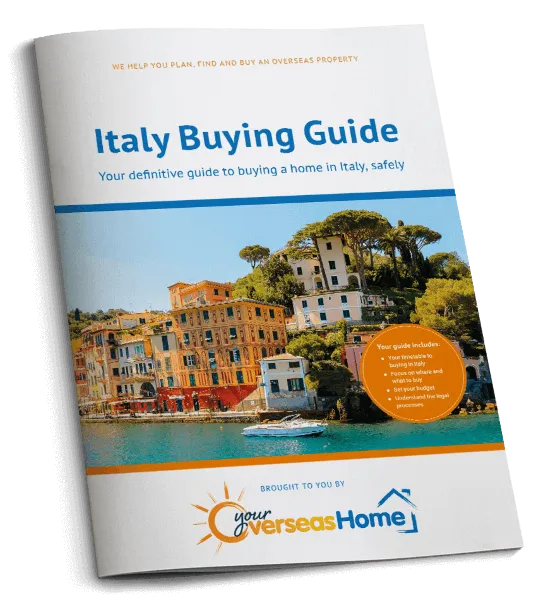The dream of living and working in Italy from your laptop can come true for non-EU citizens, as a digital nomad visa comes into law. But how do you apply?
If you dream of swapping your office for a laptop on a terrace in Italy, this could be the news you’ve been waiting for. Until now there wasn’t a legal way for non-EU citizens to work remotely in Italy. But now, you can apply for a one-year visa – the so-called digital nomad visa – and experience a better work life balance in the beautiful surroundings of the “Bel Paese”.

Your new office in Italy
Effective from the 4th April 2024, Italy is now open for applications to, as the law states: “carry out a highly qualified work activity through the use of technological tools that allow working remotely”. In other words to be a digital nomad in Italy.
Find homes in Italy via our property portal.
Over the years, spending time living in Italy has inspired artists, musicians and writers such a Byron, and Shelley. Now the age of technology is allowing a new wave of working people to experience life in Italy, while still making a living. Family members can also apply for a permit of stay. If approved, the length of stay allowed will be the same as for the worker.
According to information gathered from the Government Decree published on 29th February by the Gazzetta Ufficiale of the Republic Italia (Official news site of the Italian State) there are several criteria you need to meet in order to apply for a Digital Nomad Visa for Italy. But then, nothing worthwhile pursuing is ever easy.
Here is the list of requirements for Italy’s digital nomad visa:
1. The applicant must hold citizenship from a non-European Union country
2. Be categorised as carrying out a “highly qualified work activity” using technological tools that allow them to work remotely.
Note: To be regarded as “highly qualified” you may need to have a three years University degree, at least three year Post-secondary professional qualification, five years of experience in the sector you are working in, or three years of professional experience (acquired in the previous seven years) for managers and specialists working in the field of information and communication technologies. However, the criteria can change therefore you should check if you qualify before applying.
3. Such work is done independently or for a company also not resident in Italy.
For clarification, those defined as a “Digital Nomad” (Nomade Digitale) carry out work autonomously.
Those who work for or in collaboration with others are referred to as a “remote worker” (Lavoratore da remote).
4. Demonstrate previous experience of at least six months in the context of the work activity to be carried out as a digital nomad or remote worker.
5. Have a minimum annual income not lower than three times the minimum level foreseen for exemption from participation in health spending. Currently, this is around €28,000 annually, which is approximately £24,000.
6. Show an employment or collaboration contract or the relative binding offer, if remote workers.
7. Have health insurance for medical treatment and hospital admission valid for the national territory for the whole period of stay.
8. Have suitable documentation relating to accommodation arrangements.
9. When applying for a visa at the diplomatic-consular office, the applicant is required to present a declaration signed by their employer, accompanied by a copy of a valid identification document, which certifies the absence of convictions against them in the last five years. The visa may be refused or, if already issued, revoked, if the employer or client resident in the territory of the State has been convicted in the last five years.
After getting your visa
Once you have the visa, you must then request a “Permesso di soggiorno” (residence permit) directly from the local police head quarters (Questura) of the province you are staying in. This must be done within 8 working days from entry into the country. The permit given will read “nomade digitale – lavoratore remoto” (digital nomad – remote worker).
Digital nomads and remote workers will be provided with a tax code upon issuance of their residence permit. Digital nomads can request a VAT number from the Revenue Agency, which is informed of the visa issuance from the police authorities.
Why a visa might be revoked
Reasons a visa might be revoked include if tax obligations are not being met, or if a police check uncovers a conviction. It is advisable to speak to an Italian tax expert before applying, so that you know what paperwork is required and how much you will need to pay.
Who is the Italian digital nomad visa aimed at?
The idea of the new “nomade digitali” visa is to attract talented professionals to Italy from outside the EU. They will be contributing economically to the community they choose to live in by frequenting local restaurants and shops. Thus, helping to keep communities alive, especially if they choose more remote villages with smaller populations.
Who are digital nomads?
Forget images of young backpackers. 47% of digital nomads fall into the 30-39 age category, while 14% are in their 20s, and the rest are over 40 (Source; Localze). Some of the most common professions are marketing, computer science, design, e-commerce and writing. You will also come across architects, accountants, people in the medical fields, researchers, property managers, estate agents, translators, professors and more. What they have in common is the ability to work anywhere that they can use technology to carry out their work.
Is Italy’s rural internet up to the job?
There are villages and countryside properties in Italy that don’t have the fast internet speeds you are used to in the towns. However, the Italian government have been prioritising bringing them into the 21st century as quickly as possible. Village mayors are also pushing to improve their connectivity, to encourage young people to stay and start up businesses, and to attract new residents. Italy has an increasing number of beautiful villages where you can work remotely and enjoy a peaceful village life.
Smart Italian Cities
According to the ICityRank 2023, the Italian cities that are digitally leading the way are Bergamo, Florence, Milan and Modena. Other cities that rank near the top are Bologna, Genoa, Turin, Trento and Venice. These are followed by Cagliari, Cremona, Padua, Rome, Monza, Parma and Vicenza. These rankings took into consideration not only network technology, but also online availability of public services, utility apps, integration of digital networks, use of social media and public Wi-Fi networks.
Why become a digital nomad?
On average digital nomads are more satisfied with their work than most workers around the world. The flexibility and freedom that this way of life provides allows them to experience other cultures, pursue hobbies and explore new places. The Italian lifestyle is all about “working to live, not living to work”, and nothing comes before meal times.
The Italian lifestyle is something many people dream about, but never get around to trying for any length of time. It is wonderful to own a holiday home in Italy, but don’t you wish you could stay longer than 90 days at a time? Well now, you don’t have to wait until retirement. With a Digital Nomad Visa you could be checking your emails while sipping coffee in Florence, making new friends at a co-working social hub, or working from your laptop on your balcony.










